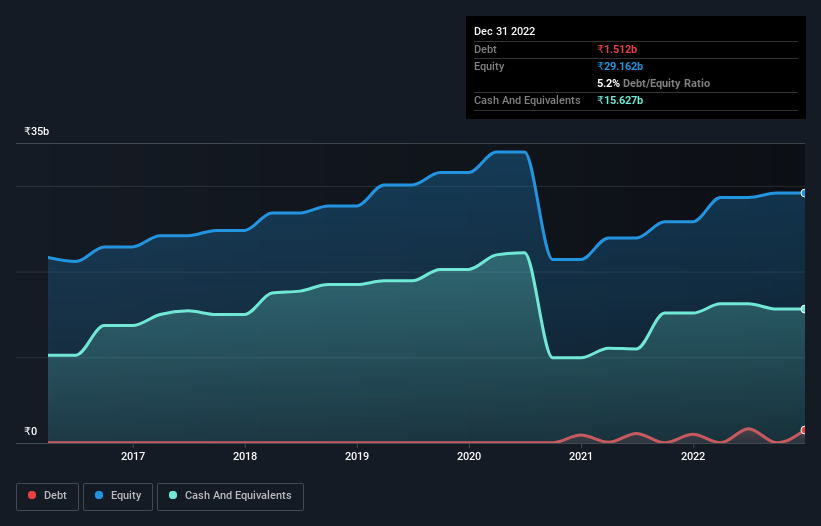Here's Why Pfizer (NSE:PFIZER) Can Manage Its Debt Responsibly
Warren Buffett famously said, 'Volatility is far from synonymous with risk.' When we think about how risky a company is, we always like to look at its use of debt, since debt overload can lead to ruin. As with many other companies Pfizer Limited (NSE:PFIZER) makes use of debt. But should shareholders be worried about its use of debt?
When Is Debt Dangerous?
Debt and other liabilities become risky for a business when it cannot easily fulfill those obligations, either with free cash flow or by raising capital at an attractive price. Ultimately, if the company can't fulfill its legal obligations to repay debt, shareholders could walk away with nothing. However, a more usual (but still expensive) situation is where a company must dilute shareholders at a cheap share price simply to get debt under control. Of course, plenty of companies use debt to fund growth, without any negative consequences. The first thing to do when considering how much debt a business uses is to look at its cash and debt together.
See our latest analysis for Pfizer
How Much Debt Does Pfizer Carry?
You can click the graphic below for the historical numbers, but it shows that as of September 2022 Pfizer had ₹1.51b of debt, an increase on ₹1.01b, over one year. However, it does have ₹15.6b in cash offsetting this, leading to net cash of ₹14.1b.

How Healthy Is Pfizer's Balance Sheet?
Zooming in on the latest balance sheet data, we can see that Pfizer had liabilities of ₹7.64b due within 12 months and liabilities of ₹1.50b due beyond that. Offsetting these obligations, it had cash of ₹15.6b as well as receivables valued at ₹1.58b due within 12 months. So it can boast ₹8.06b more liquid assets than total liabilities.
This surplus suggests that Pfizer has a conservative balance sheet, and could probably eliminate its debt without much difficulty. Simply put, the fact that Pfizer has more cash than debt is arguably a good indication that it can manage its debt safely.
Pfizer's EBIT was pretty flat over the last year, but that shouldn't be an issue given the it doesn't have a lot of debt. There's no doubt that we learn most about debt from the balance sheet. But it is Pfizer's earnings that will influence how the balance sheet holds up in the future. So when considering debt, it's definitely worth looking at the earnings trend. Click here for an interactive snapshot.
Finally, a business needs free cash flow to pay off debt; accounting profits just don't cut it. While Pfizer has net cash on its balance sheet, it's still worth taking a look at its ability to convert earnings before interest and tax (EBIT) to free cash flow, to help us understand how quickly it is building (or eroding) that cash balance. Over the most recent three years, Pfizer recorded free cash flow worth 62% of its EBIT, which is around normal, given free cash flow excludes interest and tax. This free cash flow puts the company in a good position to pay down debt, when appropriate.
Summing Up
While we empathize with investors who find debt concerning, you should keep in mind that Pfizer has net cash of ₹14.1b, as well as more liquid assets than liabilities. So we don't think Pfizer's use of debt is risky. There's no doubt that we learn most about debt from the balance sheet. However, not all investment risk resides within the balance sheet - far from it. Case in point: We've spotted 1 warning sign for Pfizer you should be aware of.
When all is said and done, sometimes its easier to focus on companies that don't even need debt. Readers can access a list of growth stocks with zero net debt 100% free, right now.
New: Manage All Your Stock Portfolios in One Place
We've created the ultimate portfolio companion for stock investors, and it's free.
• Connect an unlimited number of Portfolios and see your total in one currency
• Be alerted to new Warning Signs or Risks via email or mobile
• Track the Fair Value of your stocks
Have feedback on this article? Concerned about the content? Get in touch with us directly. Alternatively, email editorial-team (at) simplywallst.com.
This article by Simply Wall St is general in nature. We provide commentary based on historical data and analyst forecasts only using an unbiased methodology and our articles are not intended to be financial advice. It does not constitute a recommendation to buy or sell any stock, and does not take account of your objectives, or your financial situation. We aim to bring you long-term focused analysis driven by fundamental data. Note that our analysis may not factor in the latest price-sensitive company announcements or qualitative material. Simply Wall St has no position in any stocks mentioned.
About NSEI:PFIZER
Pfizer
Engages in manufacturing, marketing, trading, and distribution of pharmaceutical products in India and internationally.
Outstanding track record with flawless balance sheet and pays a dividend.
Market Insights
Community Narratives



